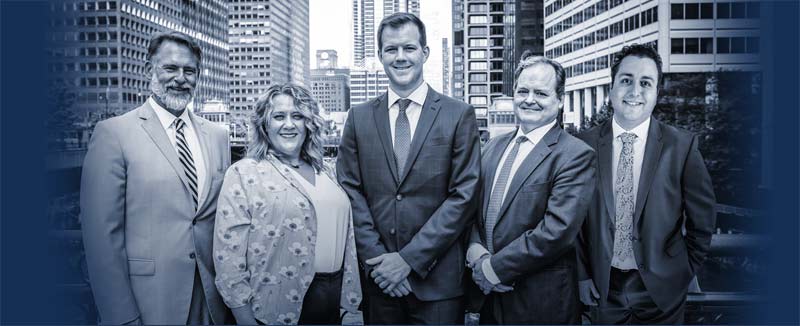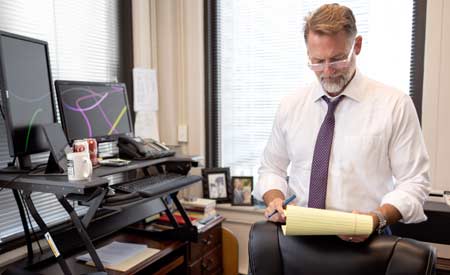Introduction
The legal profession has often been slow, relative to other industries, to evolve and adapt to the pace at which technology grows. While it may be difficult to argue that fax machines still have their place, the traditional, and perhaps antiquated, rules and courtroom procedures controlling legal proceedings have always served an important purpose in ensuring the fair and equitable administration of justice.
Like many professional industries, the legal field was not immune to the countless changes brought on by the Covid-19 pandemic. As “work from home” became the status quo, attorneys and judges alike were pushed to embrace remote court appearances, Zoom hearings, and an onslaught of email communications between parties, judges, and judicial clerks in an effort to keep the wheels of justice churning.
Near the beginning of the Covid-19 pandemic, before anyone had any idea of how long we would be prevented from appearing in person, informal emails from attorneys to the courts were necessary simply to figure out how remote court would operate. As time went on, however, the ability to freely communicate with judges allowed opportunistic counsel to take advantage of the situation. We witnessed administrative questions become more detailed, requests for clarification include more substance, and, perhaps predictably, attorneys found new opportunities to advocate for their clients. This article discusses how substantivate and informal email communications with the court are negatively impacting civil proceedings.
Ethical Concerns
Prior to the Covid-19 era, questions of law or procedure were raised via motion practice, or they would be discussed, as appropriate, during case management conferences. With access to judges at their fingertips, attorneys have taken it upon themselves to expand upon their theories and arguments—essentially treating email communications as opportunities to present arguments to the judge.
While this is a problem for many reasons, one major issue this creates is that the arguments asserted via email are not included in the formal record. This denies the Appellate Court the opportunity to view the entirety of what is submitted to the Trial Court, arguably making true justice an impossibility. Additionally, many judges have clerks review their emails and pass along communications as needed. This puts the clerk in a position to determine which information is worthy of judicial review, which is improper and further impedes a fair and equitable judicial process.
Allowing attorneys and judges to communicate regarding substantive issues during an ongoing case may create serious ethical concerns, namely related to ex parte communications. While most rules prohibiting ex parte communications focus on in-person conversations, the need to regulate ex parte emails is relatively new and may not have been intentionally excluded when promulgating the rules. Some of these issues are entirely novel and are raising questions about what is and is not allowed. For example, does copying opposing counsel on an email to the judge give an attorney free reign to argue substantive issues? If a party needs a continuance, may the judge grant the request without waiting for opposing counsel to respond?
These hypothetical issues have actually occurred. In one instance, a judge was taking over a case and emailed all of the attorneys giving a summary of what was to be discussed at the status conference the next day and asked, “is there anything else I need to be thinking about between now and tomorrow?” One attorney responded to inform the judge that they would be filing a motion later that day to be added to the agenda. This was simply a procedural note and did not contain any substantive information regarding the content of the motion. Another attorney took it upon themselves to send a lengthy, multi-paragraph response describing discovery issues in detail. These arguments should have been presented in open court where the opposing party would be given a chance to respond.
Such an email may not be “ex parte” in its traditional sense, but it can certainly have the same prejudicial effect. In researching the applicable rules, ex parte is a Latin phrase meaning “on one side only; by or for one party.” In Illinois, “a Judge shall not initiate, permit or consider ex parte communications, or other communications made to the Judge outside the presence of the parties.” Ill. Sup. Ct. R. 63(A)(5). Moreover, the duty of lawyers regarding ex parte contacts is congruent with the duty of judges, and the fact that an ex parte contact may be initiated by a judge does not excuse a lawyer’s separate duties. Ill. Sup. Ct. R. 3.5(i); see also ISBA Opinion No. 94-7.
Arguably, the definition of ex parte combined with the plain language of “or other communications” indicates that Rule 63 prohibits all communications considered to be “one-sided.” Substantive emails, regardless of who is copied on the communication, are always one-sided, as there is no opportunity to contemporaneously respond.
Ill. Sup. Ct. R. 63(A)(5)(a) makes an exception for ex parte communications regarding scheduling, administrative issues, or emergencies that do not deal with substantive matters or issues on the merits. These rules are in place to ensure that the court process is fair and that all parties have the same information as the judge who will be deciding the case. Such a specific exclusion indicates that substantive email communications are in violation of Illinois’ ex parte rules.
Furthermore, pursuant to Ill. Sup. Ct. R. 63(A)(4), a judge shall accord to every person who has a legal interest in a proceeding, or that person’s lawyer, the right to be heard according to law. Attorneys should not be compelled to issue lengthy legal briefs via email to maintain their right to be heard. Nor should an attorney have to manage their inbox as if it is the court’s docket, just to keep up with an overly zealous opposing counsel.
Impacts of Covid-19 on Formality of Judicial Process
In addition, the content of some attorneys’ emails lacks the professionalism and decorum that occurs, and is expected, within a physical court of law. One attorney responded to an email from the court containing a signed order with only the letters “ty”, the initials commonly used in texting to represent “thank you”. By this level of decorum becoming more commonplace than not, we might as well resort to calling a judge by their first name instead of “your honor”. That may seem like a large leap, but this is just one of innumerable examples of attorneys speaking to judges in an informal manner via email that would never be accepted in open court. Simply because attorneys and Judges are on opposite sides of a screen, rather than the bench, is no excuse to eliminate the modus operandi of professionalism in this field.
The Illinois Code of Judicial Conduct states that “the role of the judiciary is central to American concepts of justice and the rule of law. [J]udges, individually and collectively, must respect and honor the judicial office as a public trust and strive to enhance and maintain confidence in our legal system.” The Illinois Rules of Professional Conduct for attorneys states that, “a lawyer should demonstrate respect for the legal system and for those who serve it, including judges, other lawyers, and public officials.” These codes illustrate the high standard that both judges and attorneys alike are expected to hold themselves to. Allowing informal communications, such as the one described above, put attorneys at risk of losing some of the respect and esteem the field has garnered over centuries of providing professional services.
Conclusion
In summary, the issue of ex parte communications is still unfolding, and it is unclear whether remote court appearances will continue to be a big part of our daily reality, or if we will slowly transition to some sort of hybrid system. Either way, we know technology is here to stay and for good reason. There are clear benefits to utilizing technology to advance our field, including reducing travel time, better cost efficiency for firms and clients, ease of process, and ultimately expediting litigation under proper circumstances.
However, as we work to match our pace of adaptation with advancing legal technology, we must not lose sight of the rules which were put in place to ensure fairness and justice for all. Without clear guidance from the Supreme Court of Illinois, what communications are acceptable during this Covid-19 remote era has varied from court to court and chamber to chamber. The onus is on attorneys to continue holding themselves to the standard expected of us until we have formal rules regulating these types of interactions.



